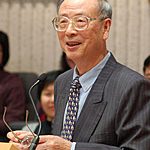
Chen Guu-ying
Resident Scholar, Institute for Advanced Studies in Humanities and Social Sciences,
National Taiwan University, Taiwan
Born in 1935, Professor Chen Guu-ying received his B.A. and M.A. in Philosophy from the National University of Taiwan. Among his teachers were YIN Haiguang and FANG Dongmei. He has held various teaching and research positions throughout his career, including lecturer at the College of Chinese Culture (1963-1966), now known as the Chinese Culture University, Taipei, lecturer and associate professor at the Department of Philosophy, National Taiwan University (1966-1973), researcher at the Institute of International Relations, National Chengchi University, Taipei (1973-1978), and researcher at the University of California, Berkeley (1979-1983).
From 1984 to 1997, he was professor at the Department of Philosophy, Peking University. Prof. Chen returned to the National University of Taiwan in 1997, where he taught until his retirement in 2005. From fall 1999 to spring 2000, he was a visiting professor at the Institute of East Asian Studies, Charles University, in Prague. After his retirement, he taught at the Chinese Culture University for three years. He is currently a Resident Scholar at the Institute for Advanced Studies in Humanities and Social Sciences, National Taiwan University.
From 1984 to 1997, he was professor at the Department of Philosophy, Peking University. Prof. Chen returned to the National University of Taiwan in 1997, where he taught until his retirement in 2005. From fall 1999 to spring 2000, he was a visiting professor at the Institute of East Asian Studies, Charles University, in Prague. After his retirement, he taught at the Chinese Culture University for three years. He is currently a Resident Scholar at the Institute for Advanced Studies in Humanities and Social Sciences, National Taiwan University. A renowned scholar of Daoist studies, Professor Chen has published annotations of many Daoist classics, including Contemporary Notes and Paraphrase of the Laozi, Contemporary Notes and Paraphrase of the Zhuangzi, Contemporary Notes and Paraphrase of the “Yellow Emperor’s Four Classics,” An Interpretation of the Guanzi “Four Books” and Paraphrase of the Zhou Yi (co-authored with ZHAO Jianwei). Among his treatises on Daoist studies are The Philosophy of Zhuangzi, New Discourses on Laozi and Zhuangzi, Yi Zhuan and Daoist Thought, The Construction of Daoist Studies of the Yi Jing, and A Critical Biography of Laozi (co-authored with BAI Xi). Prof. Chen also has great interests in Nietzsche and Existentialism and has authored Nietzsche: A Tragic Philosopher, Nietzsche: A New Perspective, and Existentialism. Professor Chen founded Daoism Studies in 1992, a journal dedicated to research on Daoism in the Chinese-speaking world, and has been the editor since then.
As the eleventh laureate of the Tang Chun-I Visiting Professorship, Professor Chen will offer a public lecture entitled “Key Philosophical Issues in the Laozi, Zhuangzi, and Yi Zhuan: On Connections Between the Thought of the ‘Three Mysteries’,” a four-week graduate seminar on “Zhuangzi” and a staff seminar in the Department of Philosophy on “Two Approaches to Interpretation: From ‘Get the Spirit, Forget the Letter’to a Genealogical Approach.”
Key Philosophical Issues in the Laozi, Zhuangzi, and Yi Zhuan: On Connections Between the Thought of the “Three Mysteries”

The Laozi, the Zhuangzi, and the Zhou Yi (Book of Change ) are rich in abstract and dialectical thought and thus have a core place in the construction of classical Chinese philosophical theories. In terms of intellectual lineage, we can detect a line of development in philosophical method in classical philosophy from the Yi Jing (Classic of Change) to Laozi. The philosophy of life emphasizing modesty , discretion, and balance between extremes advanced in the Yi Jing has a definite connection with the development of the views on human dao presented in the Laozi. From the end of the Spring and Autumn era to the middle of the Warring States, Laozi and Zhuangzi initiated the foundational period of ancient Chinese philosophy. On the basis of their metaphysical theory of dao, they established a complete, systematic view of the dao of Heaven and of humanity. Daoist cosmology and dialectical thought drove the transformation the Yi Zhuan ( Commentary on Change ) school from divination to philosophy.
To date, no research has been devoted specifically to the lineage relations between these three philosophical traditions and the links between their thought. Between completing my books Yi Zhuan and Daoist Thought and The Construction of Daoist Studies of the Yi Jing, I self-consciously applied genealogical methods, on the basis of philosophical content and textual arguments, to write a paper entitled “The Intellectual Lineage of the Four Classics of the ‘Three Mysteries’.” This paper presented a developmental account of the intellectual lineage from the Yi Jing to the Laozi to the Zhuangzi and then to the Yi Zhuan .
The Zhou Yi comprises two parts, the Yi Jing and the Yi Zhuan . After the Wei-Jin era, these together with the Laozi and Zhuangzi became known collectively as the “ san xuan, ” or “three mysteries.” Actually, the “three” comprise four, not three, classical texts, which were written from one or two to five or six hundred years apart. The Yi Jing, composed of explanations of hexagrams and their lines originally based on divination records, was compiled between the Shang and Zhou dynasty interregnum and the early Western Zhou, making it a work of the pre-philosophical era. Hence in discussing the shared philosophical issues of these texts, the present essay will focus on the Laozi, Zhuangzi, and Yi Zhuan only .
(Translated by Chris Fraser)
On Zhuangzi
27 Mar 2009 (Fri)
3 Apr 2009 (Fri)
17 Apr 2009 (Fri)
(Please refer to the Chinese page for course outline)
Two Approaches to Interpretation: From “Get the Spirit, Forget the Letter” to a Genealogical Approach





